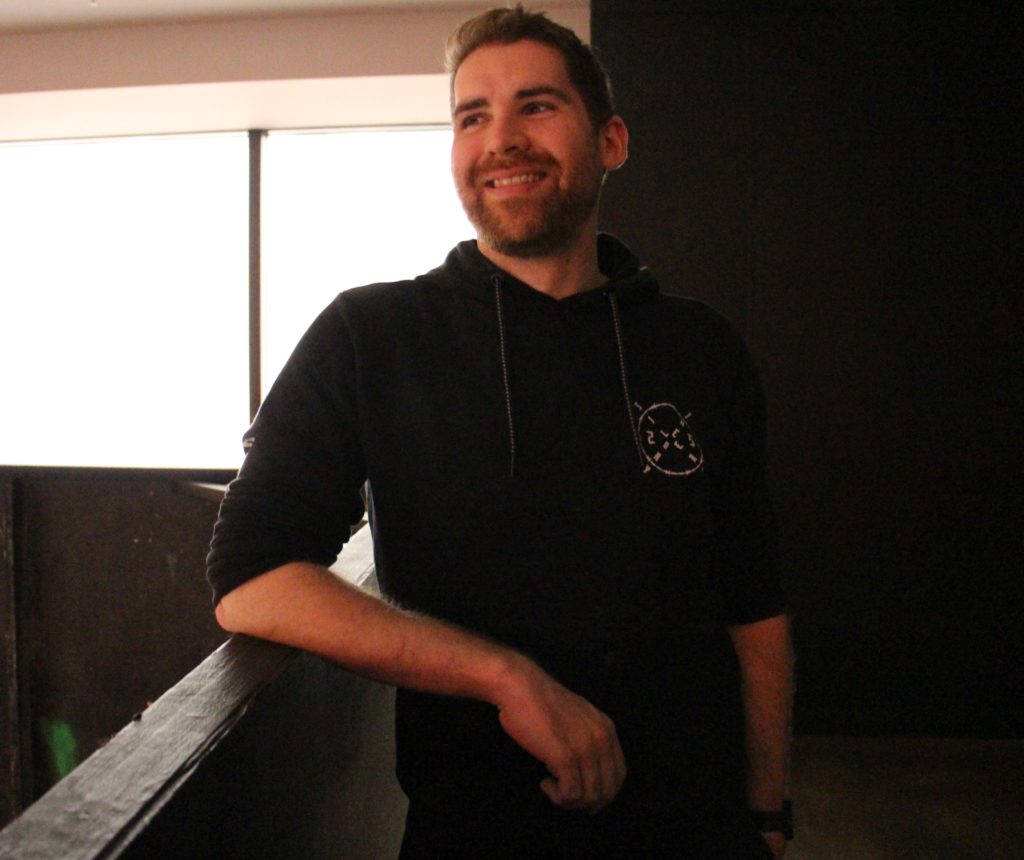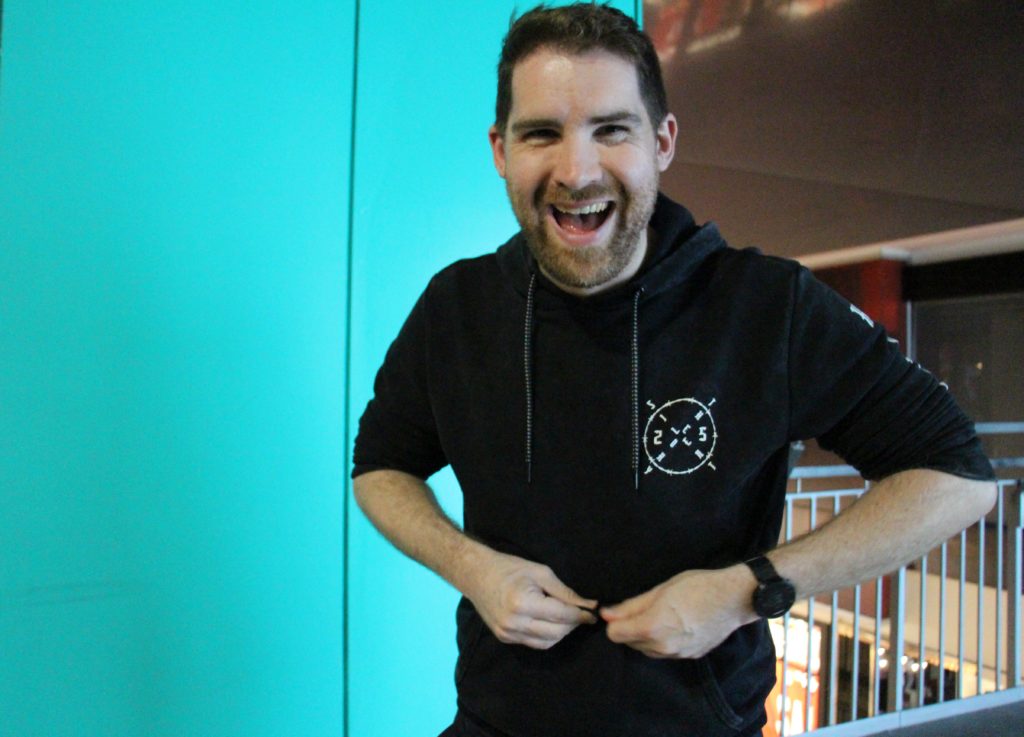DAVID, 34 Explorer
Please be aware that this interview may cause distress to some readers. If you experience distress then please seek assistance and lean on your support networks.
How are you feeling?
I feel good a little nervous now, no I feel good.
Can you tell me about your journey with mental health so far?
Wow, that’s a big question – My journey with mental health, I think the beginning of that is when you realise you have mental health issues. I think growing up I clearly did, but I didn’t realise. I think when you’re a kid you just kind of think “This is the way I am, this is normal”. You don’t think “oh I’m suffering from depression, this is my mental health issue”. It just is. I had suicidal thoughts when I was 12. I can look back at that journey now, but at the time I had no concept of mental health or anything like that. The first step is realising you have a problem, and I think also getting over that fear of asking for help because it takes a lot of courage to say you can’t cope with something. Recognising you have a problem and then seeking help for that problem is probably the first step along that journey.
Do you remember what those suicidal thoughts were triggered by at 12 years old?
Yeah, I was being bullied by my PE teacher, and I was also being bullied by the students which wasn’t great. The main antagonism was coming from a teacher, so I would be humiliated in front of the class and be made to feel like crap, and go home and cry. It felt like the problem wouldn’t get better. I think at that young age you assume that the problem is you. You trust adults, so if an adult is treating you badly or humiliating you, I’m very trusting so I just kind of took that. I thought I deserved that then, I wasn’t mentally strong enough to say “this isn’t right”. I would say that it was because I had never felt like that ever before, it was only after the bullying started.
What was he bullying you about?
I was an overweight kid and I didn’t like sport. I was shy and quiet. Also I wouldn’t be surprised if some of the bullying from the other kids was homophobic in nature. I was kind of the opposite of him, he was really sporty, aggressive and extroverted. Whereas I was unfit, introvert and very passive so I was the perfect target to pick on.
Were you able to speak to anyone about what was occurring?
I was scared to tell anybody. I was scared to tell any other teachers because I felt like they would all be on his side. If a police officer does something wrong, do you go to the police? It’s this feeling that they will all be on their side. I felt like there was no teacher I could confide in, I dealt with it all on my own.
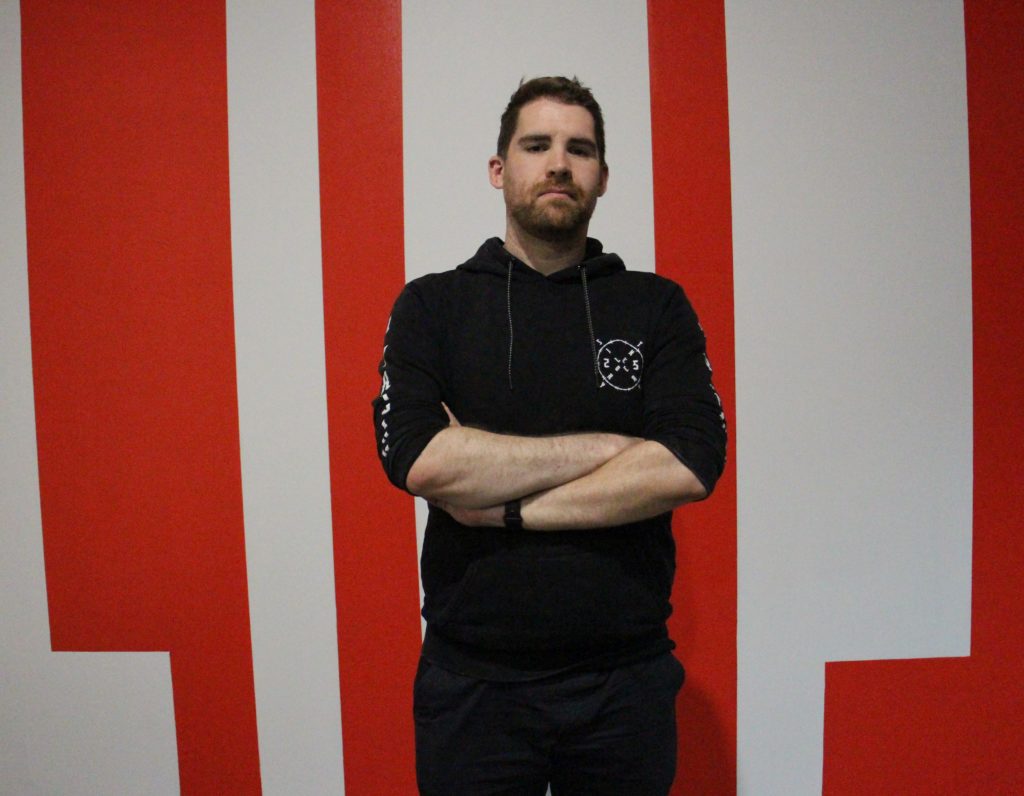
What was the outcome from the bullying?
I stopped wanting to go to school because it was too upsetting, I’d just stay home. It got to the point where I was missing so many days of school it became an issue. My parents ended up taking me out of school. I actually only lasted for one term then I started home schooling.
How was your home schooling experience?
It solved the issue of the bullying, but it created its own problem in that it’s very socially isolating. I had one very good friend from Primary School that I remained friends with for 2 years after I left school. When you’re a kid most of your socialising is at school, so when you don’t have that you really don’t have any friends. I grew up with no social life basically, I would just do everything with my parents.
What were you feeling at that point?
I think it felt normal because that was my world, I didn’t really know any other, but I would have liked friends. I got along really well with my parents so I didn’t mind doing stuff with them, but at the same time I did feel lonely, I would have liked to have people my own age.
What was the turning point to pull yourself out of this situation?
At that time I didn’t, it just got worse. Basically, I had anxiety and depression from dealing with the bullying, I can look back now and say that. I dealt with those feelings with eating. I got into comfort eating, where the only thing that really made me feel better about myself was eating. That becomes a vicious cycle, because I wasn’t exercising. I was eating really bad food and a lot of it, so I started putting on more and more weight. I hated myself for that, but the only thing that made me feel better was eating. You would hate yourself for being fat but then you would eat and temporarily feel better, then hate yourself again. It’s this kind of cycle this self-destructive cycle, and I wasn’t aware of that at the time. I was going through the motions. My decisions were very emotional, they weren’t logical because at that time I didn’t realise I had depression. I didn’t realise I was using food to make me feel better. You don’t question it in the moment. Growing up as a teenager I was socially isolated and had no friends, and I pretty much just got fatter and fatter.
I became more uncomfortable going out in public. I remember once going out with my parents to a shopping centre and it was a hot day. I remember wearing a raincoat because I wanted something to cover me. I wanted something to cover my body and the feeling that “everybody is going to stare and look at me because I’m so fat”. That’s what I was trying to protect myself from. At no point did I think I was going to draw so much attention to myself for wearing a raincoat on a 30-degree day. I was just stuck on “I have to cover my fat, I have to cover my body, because it’s so disgusting and people are going to hate me for this”. I had those feelings quite strongly in this sort of self-hatred, and that got to the point where when I was 17 I couldn’t leave the house. The idea of leaving the house and being seen by people was too traumatic, and so I stopped going out altogether. That was when I was 17 or 18, and that became my life. I didn’t leave the house for 5 years, literally didn’t go out the front door for 5 years.
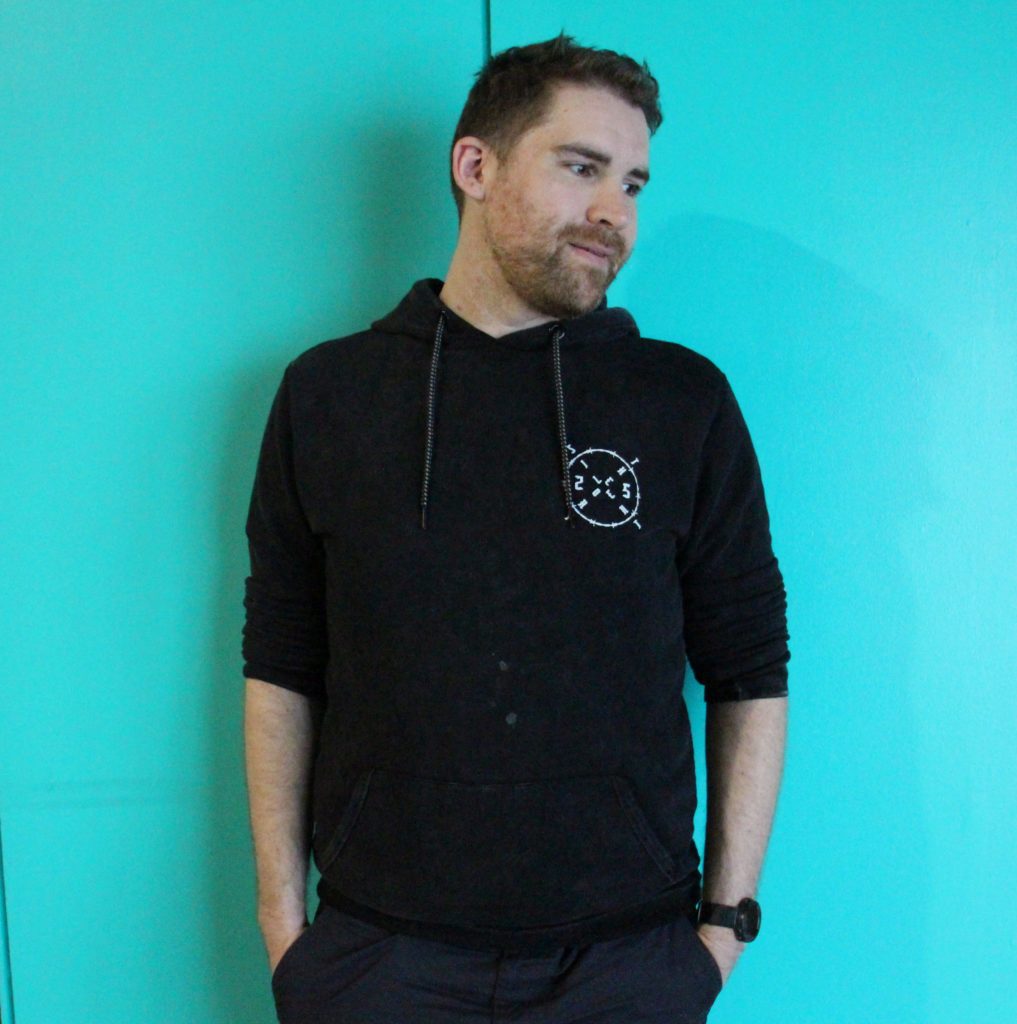
What happened was, my doctor said “This is a problem, I’m going to get you a Psychologist”. It’s a strange thing, because I liked being home but simultaneously hated it. I really wanted to go out, but in my head, everything outside was scary, frightening and awful. The only place I felt safe was inside. Yet I really wanted to go out, wanted to be around people, have friends, go to the movies and do things but I felt like I couldn’t. There was something in my head saying “You can’t go out”. For a long time, I didn’t even feel like it was a problem, it just felt like I accepted it. It wasn’t really until my Doctor said I needed help, that I kind of really stopped and thought about it and thought, “well yeah, this is a problem”. That was the first time I ever had dealings with a Psychologist, or really thought about my mental health in any capacity really. Even though I had been dealing with mental health issues my entire life, this was the first time where somebody said “I think you need help with this”. I recognised in myself I wanted help, so at that point she came to the house because I couldn’t go to her. Literally our first step was to get to the letterbox. To physically go through the front door and walk to the letterbox. That took me a couple of weeks to work up to that, that was a big deal. She was amazing, she changed my life in a big way. By the end of our 10 sessions, I was able to get on a train and go to her clinic by myself, which was incredible.
The thing is I wasn’t working and we didn’t have a lot of money, and psychologists can be quite expensive. I got 10 free sessions, but then after that I got nothing. After seeing her, I wasn’t going out socially, but if I had an appointment with Centrelink or the Doctor I could go. Going out was traumatic but at least I could still go out, so I got over that barrier. I guess the next milestone would be in 2008, when my brother almost died. My family is my world and I love my family very much. We’re very close, but you become even more close when you don’t leave your house for so many years. That’s your entire life, pretty much. He ended up in hospital for months, and that was probably the most painful time of my life. I visited him once when he was in hospital, and that was really difficult to do but I’m glad that I did it. I remember him being really shocked that I was there, because he knew how hard it was for me to leave the house. That period caused a spike in my anxiety and I started eating even more, to the point where I became morbidly obese. I was getting close to 200 kilograms and my health was really starting to suffer. I still wasn’t leaving the house much.
We get to 2011 and my health is really bad. I’m feeling dizzy, I’ve got vertigo, I’m out of breath, I’m getting chest pains I’m feeling really, really bad. I remember one night – my chest was really hurting badly to the point where I probably needed to call an ambulance, but my anxiety of being around people and leaving the house was still so strong. The idea of leaving the house, being in an ambulance and going to hospital was still incredibly frightening. I remember forcing myself into bed and trying to fall asleep and forget everything, and I couldn’t. I was in so much pain that I started convulsing with anxiety, my legs just started shaking. At that point, I thought “I just can’t deal with this, I have to call for help”.
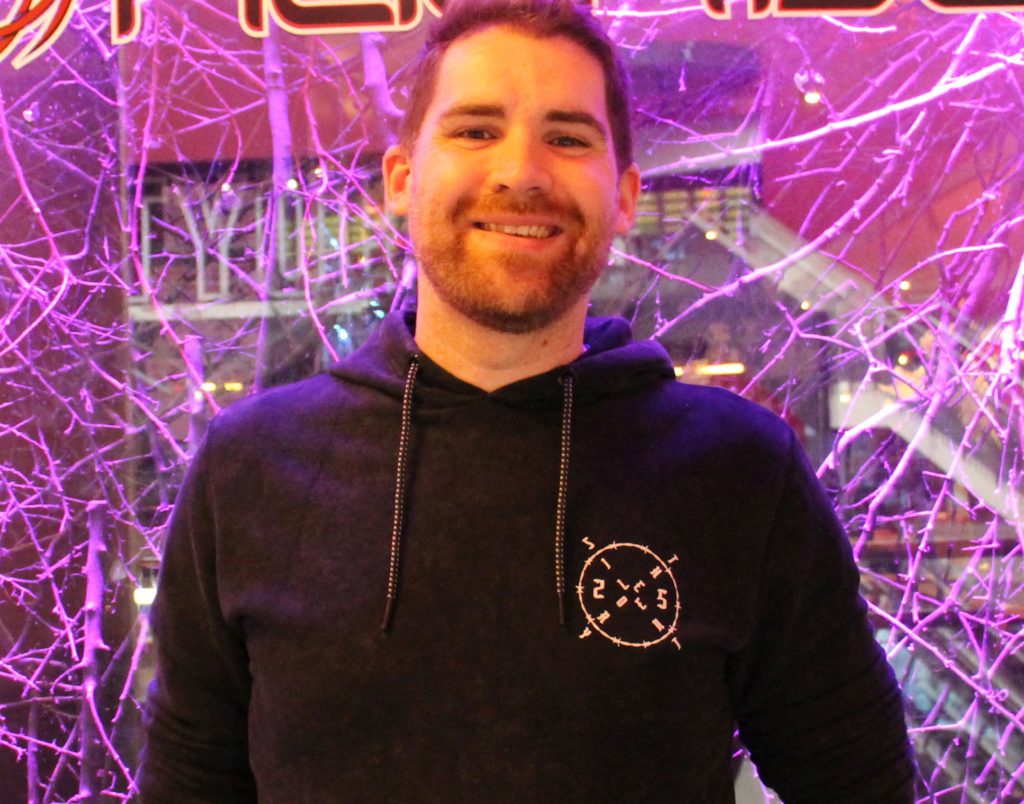
I went to hospital and I remember actually enjoying being in the ambulance, because I hadn’t been in a car for maybe 15 years. To be able to see the streets at night, it felt like freedom in a way. The paramedic was really nice to me. This was interaction with humans which I had so little of, it was really nice. I was in hospital for about 6 hours, but they couldn’t find anything wrong with me. I’m assuming it wasn’t anything seriously wrong. It was probably a panic attack that I had, not a heart attack. I remember going home after the hospital, standing in the bathroom and crying because I felt so lonely. I really liked being around people and I just felt so lonely after that. I just felt so isolated and cut off from people and that’s not what I wanted, even though I had cut myself off from people for so long. After that I was still feeling really unwell, so I decided to go to a Doctor. I remember sitting in the waiting room, and everybody was staring at me.
At this point I knew I was overweight, but I didn’t think it was that bad. I didn’t really have any idea how bad my weight problem was. I couldn’t understand why everybody staring at me. I got home and took off all my clothes and took a photo of myself naked and what I saw just left me in shock. I couldn’t believe how big I was and I remember thinking “that’s it, there’s no coming back from here”. I felt like I was standing on the edge of the abyss and there was no hope. I fell into a really deep depression, where I thought the only thing I could do was kill myself. I thought suicide was the only thing I could do because I have no hope, and those were a couple of really dark days for me. I remember waking up one day and thinking “Fuck it, I want to live, I don’t want to die, I want to live”. I think my core values were I’m worthless, I’m ugly, and I have no value as a person. I think I even thought of myself as subhuman. I thought this is going to be really hard, but you have to start somewhere. I started to try and lose weight, but when you’ve never exercised and your diet is really, really bad (I would eat so much, huge portions of really unhealthy food), it’s really hard to break those habits of a very long time. I found it very difficult to get motivation. I’d get motivated then lose it, then get it then lose it. I kind of started and stopped for 6 months, where I tried to gather information from the internet about what’s healthy to eat and bits and pieces on exercise. I tried my best but it was just hard to get into a motivated routine.
The next big turning point for me was, in 2012 I saw the movie Brokeback Mountain for the first time. It had a really, really powerful emotional impact on me. The theme of regret on getting to the end of your life and realising you haven’t lived your life how you wanted to, I didn’t want to do that. I didn’t want to get to the point where I’d wasted my life and I felt like I hadn’t been living life the way I wanted it to be. I think I was living my life how my anxiety and depression had dictated it to be, but I never had freedom to live my life the way I wanted to live it. I had a deep desire for human contact that I really didn’t have, the feeling of wanting to meet people, have friends, and have relationships. I was a mess after that. It kick started a fire in me I really want to change my life.
That was the motivation I needed, because after that I started exercising regularly and eating well. I lost 80 kilograms over a year and a half. That had a massive impact on my physical health and mental health. That really changed my life, I was a different person after that. The healthier I felt physically, the healthier I felt mentally. I felt proud of myself for sticking with something over a period of time, and starting to feel the benefits of that. The exercise left me feeling positive and happy with myself and I felt like I was achieving something. I still wasn’t leaving the house through all of this. I was losing the weight inside, but it got me to the point where I was able to consider going out. I got to under 100 kilograms in February 2013 and I was really excited about this. The last time I’d properly gone out for a social thing was back in the Year 1999/2000 Christmas and New Years. I had family in Bendigo, and we were up there but that was at that time, 13 years ago. Once I got to under 100 kilograms which was a big goal of mine, I said “Let’s go up for a family vacation for my auntie’s Birthday”. Her Birthday was in August that year, so I still had quite a few months to go. I thought this was good goal to work towards, and in the lead up I still wasn’t going out. It was still a big source of anxiety. Even though I had lost all of the weight, there was still a part of me that felt I couldn’t leave my house.
It got to the day before we were supposed to go away and I still hadn’t left the house. I thought, “well I can’t back out of this now, the accommodation is booked, the train tickets are booked, my family are excited about this, people are expecting me”. I couldn’t pull out even though I really wanted to. I thought, “well I just have to go through with this”. We got a taxi at 4.30 am and we got the first train at 6.30 am. I was thinking there would be no people on the train at that time. It was weird being out on the streets, I hadn’t been to Melbourne for 13 and a half years, and I could manage it in the morning because there were no people around at that time. We got to the train station and I thought, “I’m doing this, I’m actually doing this, I feel a bit on edge but this is okay”. We got onto the train and I didn’t realise at that time of the morning there was going to be a lot of people going to work and school, and so the train ended up becoming packed. That was not what I was expecting, I felt like I was being dumped in the deep end. I didn’t freak out, I just tried to acknowledge my anxiety and just go “there’s nothing I can do about this, deal with it the best way you can”. It was odd, I remember one big sensation I felt, there was a kid sitting across from me and we were close enough I could smell the toothpaste on his breath. That was the most intimate experience I had with a human being for years. It was like I was an alien being around people for the first time. I just remember feeling very close. It was a very different sensation to sort of feel these different emotions and senses. Throughout that day, I found my anxiety peaked and it just kind of plateaued and then started going down. I wouldn’t say I felt comfortable, but I didn’t feel panicked that I was out and around people. By the end of that day, I did actually start feeling comfortable being out. That vacation was actually a massive turning point. I remember getting home, feeling like this was a real turning point. I was able to start going out, but I started to see a psychologist to help with the transition because I felt I needed a bit of help. I’d done a lot of work myself but I felt I needed to talk to somebody if I was going to start going out and interacting with people, I felt I needed that support. That was September 2013, where I started leaving my house properly and started doing social things.
I had essentially been socially isolated since I was 12 when I started home schooling, so basically all of the experiences I started to have were all new experiences. One of the first things I did was join a football team, so that had a lot of social stuff attached to it. I made a lot of friends very quickly and through that I had my first experience of getting drunk. Going to a party and coming out to people, not knowing how people would react, talking to people and all these social interactions that people take for granted, I was experiencing these things for the first time. In a way, I felt I was a teenager trying all these new experiences and learning from mistakes, and just being excited about all these different things.
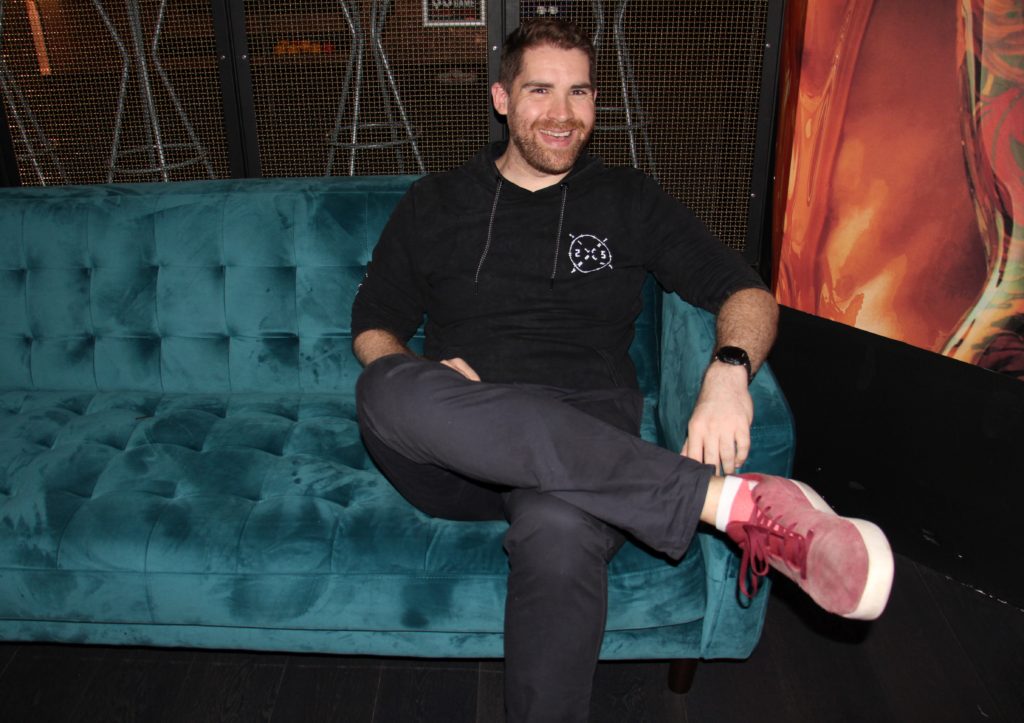
It’s funny because when I started going out, I had an American accent which I assume is because I wasn’t really interacting with other Australians, and I was surrounded by American TV and movies. I remember I was on a train station and there was this guy who asked me how the Myki machines worked, and I explained it to him and he said “what part of America are you from?” and I’m said “I’m Australian, not American” and he insisted “you have an American accent, you must originally be from America?” and I’m like “no”. It started happening a lot, a lot of people started asking “oh so you’re from America?” That was cute but I hadn’t realised, which made me realise how much time I had spent away from society. At that point, I then started rebuilding my life because my depression and anxiety had basically stripped me of my ability to live my life how I wanted to. At that point I had taken that control back, and I was out in the world on my own two feet learning how to build the life I wanted to live.
In terms of your parents, were they pushing you to leave the house or were they supportive of you staying indoors? How was the relationship with them?
I’m very close with my mum. My situation of not leaving the house, I think for a long time both of us felt that it was a choice. She definitely felt it was a choice for a long time and it was a choice that she felt happy with. She would tell people that she was happy that I didn’t want to go out. I think when I started wanted to go out there was some resistance from my mum. We’d built a relationship where I was dependent on her, and that gave her a degree of purpose. I think it’s easy for people to become comfortable with the status quo, so when I started wanting to change that, that was an emotional thing for her. In a way, I was changing the dynamics of our relationship, where I wanted to be independent of her and so that would essentially take away one of her roles, a role that she really enjoyed. Again, it wasn’t out of a negative thing, it was out of love, wanting to take care of me. But at first, I was met with resistance from my mum, she didn’t want me to start going out.
Do you think she was protecting you by keeping you at home?
Yes, absolutely.
Did you feel you were getting a proper education at home or you wanted more for yourself?
I’m really interested in the world and things, so I educated myself a lot. I would read a lot and watch a lot of documentaries. I did put to good use where that time spent inside, I was doing a lot of reading and educating myself. I don’t have a formal education but in a way, I don’t feel like I missed out on anything that would prevent me from being able to engage intellectually with people.
Currently, do you suffer from Depression and Anxiety?
Yes I do, it’s something that I don’t think will ever go away. I look at it in terms of management where, now most of the time it doesn’t affect me to the point that I feel like it’s winning. Everybody is going to feel a degree of anxiety and I don’t think my depression will ever go away, but I feel like I’m in control of it now. Just being aware of it is a great first starting point, and I can say that I love myself now, whereas before I didn’t. It’s a really important step to be able to accept yourself and realise that you are worth it. For so long my feelings were of self-hatred, “I’m not worth it, I’m worthless”. When your thoughts are like that it’s feeding your depression, giving fuel to it. It’s really hard to get out of that mindset. I find when you’re good to yourself and you love yourself, you can still have days where you’re not feeling great and the depression is there. It gets you down but if you love yourself you can say, “yeah, I’m not having a good day today but it’s not the end of the world, I’ll get through this like I always do, or maybe I need to ask for help and that’s not a problem”.
Now I have really good friends that I can reach out to, you know I don’t hesitate to do that. If I’m feeling particularly anxious about something or not feeling great, I will be really honest and open with my friends and I get a lot of support which is really nice. One pet peeve I have with the portrayal of mental illness is the misconceptions surrounding Obsessive Compulsive Disorder. Many people will flippantly refer to their desire for order and tidiness as their “OCD”. And while that can be a component to the disorder, its insidiousness spreads much deeper and crueler than that. The element of upsetting thoughts and images bombarding your head is a punishment I would not inflict on my worst enemy. The irrational, repetitive behaviour (which does include hand washing, light switch flicking etc, but are often just the tip of the iceberg) are almost a desperate act of bargaining to vanquish the ceaseless mental torture.
A common occurrence would be the image of my family being killed – and the only way to prevent this from happening would be washing my hands so many times they would go numb from the cold water. Out of my experiences of mental health issues, my OCD was probably the most distressing, and that often isn’t captured by this false concept of it being just a little too neat.
Do you remember the first friend you made after leaving the house?
Yes, I do he played football for the team that I joined, he was a couple of years younger than me. He was just really lovely, he came up to me and started chatting because he could tell I was quite introverted and shy. He came up to me and tried to make me feel more comfortable and we just got a long really well. I remember being invited to his place, hanging out, just doing normal friend things, but it felt so precious and exciting, it was an incredible experience.
Looking back on your journey, what are you most proud of?
That’s a good question. I’m proud of facing things that cause a lot of anxiety and pushing through that. I think that’s been the most rewarding thing because I feel like you have to push out of your comfort zone to get to a better place. It’s so easy to want to stay where it’s nice and comfortable, but I didn’t realise how strong I was until I was pushed and I pushed myself. You realise you are capable and I don’t think I really was aware of that before. I’m proud I had the courage to not give up.
Do you feel you’ve accomplished all you’ve wanted to achieve since leaving your house?
For most of the time I was in my house I had accepted that that was how my life was going to be for the rest of my life. I didn’t have any feeling of hope that I was going to get better. I had things that I desired in the back of my head but I didn’t really focus on them, because I thought they would always be out of my reach. When I decided it was my goal to lose the weight, I had a plan to lose the weight, start going out, go back to study and get a job. That was kind of the trajectory, that was the outline that I had. I have achieved all that, so yes, my outlook on life has changed now that I’m at this position. I kind of want to look for new opportunities and new experiences. I would say that I have achieved what I wanted to.
Do you find your more confident in yourself now then you ever have been?
Yes, definitely. For example, a couple of weeks ago, I joined a wrestling team. It’s something I’ve wanted to do for a very long time, but in my head I had many reasons why I couldn’t do it. It was too intimidating, I thought I might not be good at it so I shouldn’t try because it would be embarrassing. All this anxiety talk that you use to talk yourself out of things that you want to do. I thought “well look screw it, I want to do it, have a go” and I remember going on the first night, it felt odd and I didn’t have anxiety, I just felt really confident and comfortable. That was really nice and I’m really enjoying it, I’ve met some lovely people.
Do you think you had to go through everything you did, to find where you are now?
Yes, I wouldn’t change anything that’s happened because this is my life, this is who I am. Do I wish all of that stuff hadn’t happened? Yeah probably, but I can’t change that, it’s happened. You can’t change the past, it is what it is, and I like living by the idea that it’s not about what happened to you, it’s about how you react to it. I try to take a lot of strength from where I’ve come from and I think it gives me a lot of empathy. I think from I can take a lot of positives from all of that negativity. I feel it’s my journey, this is who I am.
If you could say three values that you love about yourself what would they be?
Okay, so I would say my empathy. I always try to not judge people even if I don’t understand where somebody is coming from. I try not to judge because you don’t know what people are going through. At all times, I try to be empathetic towards everybody, I think that’s a really good quality. I see the results of when people aren’t empathetic, and it’s not great. Even if you personally can’t relate to somebody or their story, I think it’s a really positive thing to attempt to imagine where they are coming from. It’s just purely as a human being, another human being that is a complex person filled with different thoughts, feelings and emotions. I think empathy is an incredible, incredible thing. I love my sense of humour, I realise that’s a really important quality that I find in other people and I find that reflected back in myself. I don’t mind making fun of myself and I think it shows you’re comfortable with yourself when your able to be self-deprecating. I love making people laugh and I find that’s a really good way of building relationships. I also have a pretty dark sense of humour, but I think that’s a good way of dealing with a lot of crap that goes on in life, just not taking yourself too seriously. Another thing that I love about myself, I’m not sure how to encapsulate this in one word -maybe diverse or complex. I like the fact that I have a lot of interests. I like arthouse movies and literature, but I also like crappy B-grade stuff, and I come to terms with everything on its own merits. I’m a lot more comfortable with my sexuality now than I was, and I like the fact that I like cutesy things such as teddy bears and Pokémon. I also like that I have a real sexual side, I like embracing this sort of real yin and yang in me. I don’t see a contradiction in any of that, which I’m actually really grateful to be comfortable with.
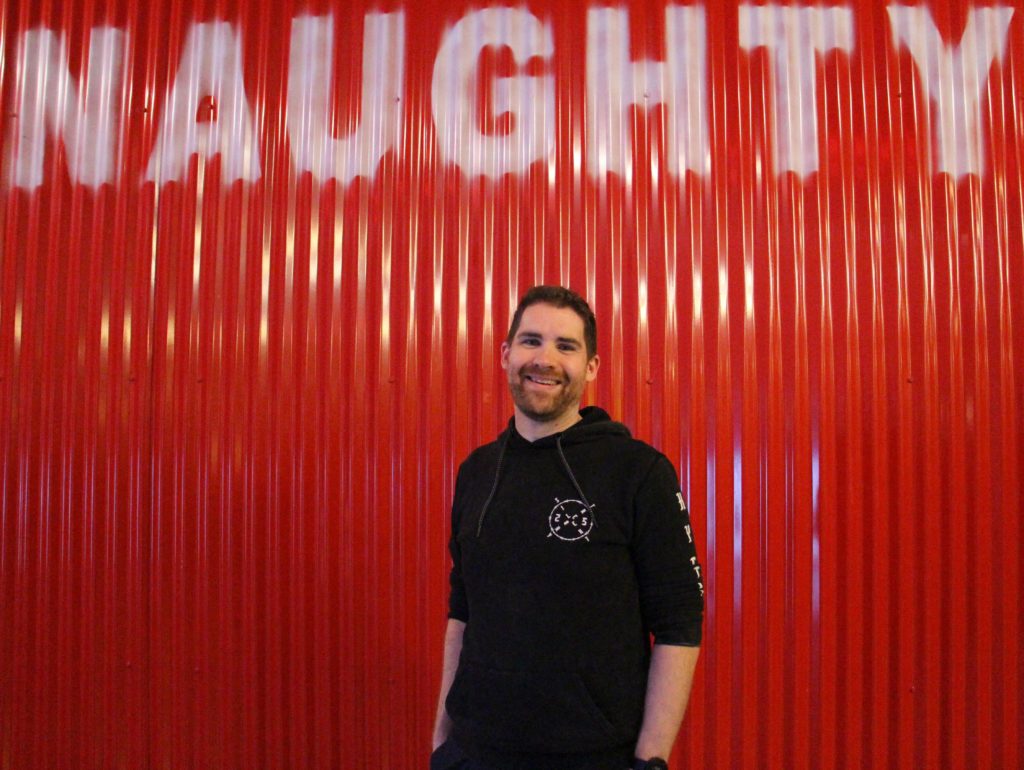
At what stage did you come to terms with your sexuality?
That’s a good question, I came out pretty late in life to my parents even though it was an open secret. I knew I was gay since I was a kid but I didn’t realise what it was. I knew that I liked boys but I wasn’t really aware, I just kind of thought everyone felt that way. I was quite ignorant in my own sort of world, and I didn’t realise that until I was 11 or 12 when I read a Sex-Ed book. There was this one little page on homosexuality, I remember reading that and thinking “oh wow, I have a word to describe my feelings”. It was exciting but it was scary, because when I was a little kid I thought everyone thought like that. I didn’t question it, I just took it at face value. Then you get to a stage where you think you’re the only one who feels like that, because you become so aware that it’s not expressed in the media around you or in the lives around you. I think when I had learnt about homosexuality it was exciting, but I also realised for the first time it could be something that people could hate me for. At that point I became aware of low level homophobia from my parents. If there was a news report about the Mardi Gras my Dad might scoff and say “that’s disgusting” or my Mum might laugh awkwardly. You kind of grow up feeling “what if they find out? will they still love me?” and you become really self-conscious about that. I remember as a kid I really liked professional wrestling, as a teenager I became really self-conscious watching it around my parents. I thought this is so homoerotic, I don’t like them thinking I like watching naked men fighting. I think you get really paranoid and think everyone can read your mind when you’re carrying this secret about you, so I never had any question about hiding it, I felt I had to hide it.
How’s your experience been since coming out?
As I got older I became less self-conscious about hiding it and it was kind of like an open secret. I would watch a lot of gay movies or have gay books and things that my parents knew about, it just wasn’t openly discussed. I think the other thing is because I wasn’t leaving my house, I felt self-conscious about sexuality in any way. Even if I was straight, I wouldn’t have had girlfriends being socially isolated. The idea of sexuality being something that required more than one human, I felt like it was out of bounds to me in any regard. That added an element of self-consciousness to being sexual but when I came out to my parents, I felt like it was more for my own benefit rather then theirs. In a way, I felt it was a rite of passage that I needed to do. When I came out to them they just kind of shrugged, “tell us something we don’t know, big deal”. But it was like a big step to say those words, to finally be totally open. I didn’t really feel like it changed anything with my parents, they kind of already knew and they were accepting of that. I have noticed my Mum has come a long way, she wasn’t super negative about it but she’s a lot more accepting of it now. She is 70 years old now and a lot of her circle of friends are quite conservative and old fashioned, they might ask if I have a girlfriend and my mum will now say “oh no my son’s gay, he likes men”. That makes me so happy to hear that, it’s so cute. She never would have said that before so I really like the fact she’s that comfortable with it, it’s really nice.
Would you say the Gay community has been a blessing for you?
That’s a good question, I would say the gay community is complicated. My relationship with the gay community has been complicated as well. I remember going to my first gay club and feeling really intimidated, feeling out of place and not sure how to deal with it. I feel like I still needed to come to terms with it myself to a degree, and I think there’s elements of being confronted with your own internalised homophobia and feelings of inadequacies, that’s something I had to deal with. I think a lot of people are going through that but I don’t think it gets talked about a lot. I think a lot of people are too ashamed to talk about that. There’s enough external homophobia that it feels reductive to be doing it to yourself and express that. It almost doesn’t make sense and you kind of feel guilty for feeling that. I’ve met quite a few people who feel like that, I think the only way out of that is reaching out to people and discussing your feelings, and I guess just coming to terms with yourself. I think that comes together with the whole thing of learning to love yourself and accept yourself.
Would you be in a relationship with yourself, David?
I think I would be, I know myself really well. That’s a weird thing to imagine. I think I’m aware of the major points that I would like from a relationship. I feel like communication is really important, and I’m somebody who likes talking, like talking about how I feel, talking about uncomfortable things. I don’t see silence is a positive option, so I’m all about communication. That doesn’t mean I have all the answers, but just acknowledging what you’re feeling and being open to talking about it, I think that’s a really important element to a healthy relationship. I went on a date recently, and it taught me that a sense of humour is really important to me, it’s pretty much a deal breaker. I got along quite well with this guy but we didn’t share a sense of humour. He didn’t make me laugh and we didn’t have any sort of banter. Afterwards, I reflected on that and thought that’s a really big problem. I realised that sharing a sense of humour is incredibly important, that’s a very important part of how I express myself. So if that’s not open from the other person, that’s a deal breaker.
Reflecting on your journey, if you were standing in front of your past self and had a message for yourself what would that message be?
You’re far stronger then you can even begin to imagine, you do have value. You are a beautiful person and you should share that with the world.
How are you feeling now?
I feel great.
